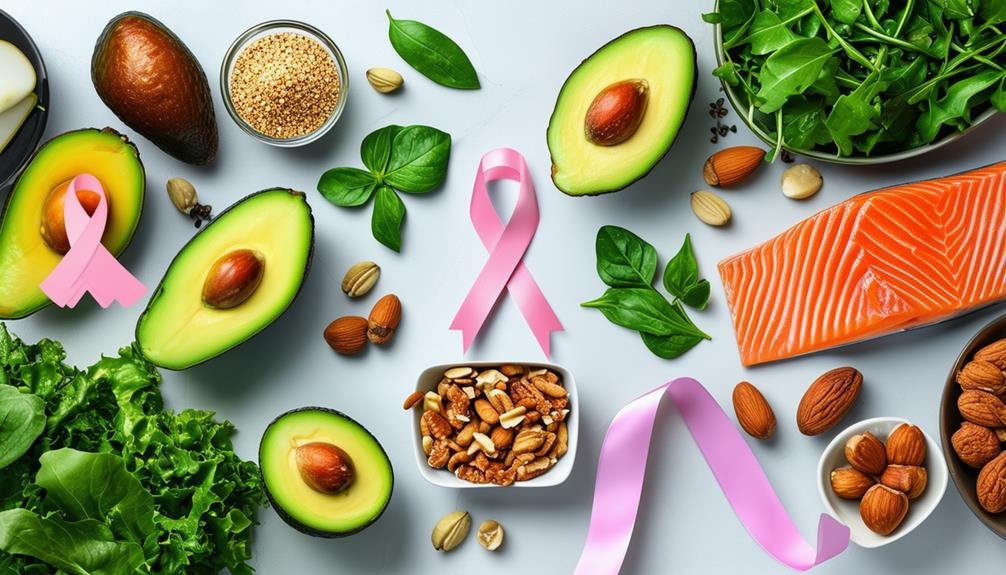The ketogenic diet, which focuses on high fat and low carbohydrate consumption, may play a role in both cancer prevention and management.
By lowering glucose levels, it creates a less favorable environment for glucose-dependent cancer cells. The diet generates ketone bodies, such as β-hydroxybutyrate, which have been shown to potentially inhibit tumor growth.
Studies suggest that it may slow tumor progression, enhance the effectiveness of certain cancer treatments, and improve overall survival rates in some individuals.
However, there are potential risks, including the possibility of nutritional deficiencies and the potential for tumor growth in certain types of cancer.
It is crucial to consult healthcare professionals to customize the approach to meet individual needs, while also monitoring safety and effectiveness.
For more information on current research, please refer to ongoing studies in the field.
Key Takeaways
The ketogenic diet, characterized by high fat and low carbohydrate intake, may inhibit the growth of glucose-dependent cancer cells. Research indicates that achieving ketosis can lead to the production of ketone bodies, such as beta-hydroxybutyrate (BHB), which serve as alternative energy sources and may slow tumor growth. Additionally, the reduced insulin levels associated with the ketogenic diet may enhance insulin sensitivity, potentially lowering the risk of cancer development. Clinical studies have suggested that this dietary approach might improve emotional well-being and could extend survival rates among cancer patients. However, it is essential to consult with healthcare professionals prior to initiating a ketogenic diet for cancer management, as this ensures safety and helps address any potential nutritional deficiencies.
Understanding the Ketogenic Diet
The ketogenic diet is characterized by its high-fat and low-carbohydrate intake, promoting a state called ketosis where the body primarily utilizes fat for energy. Typically, this dietary approach comprises about 70% fat, 20% protein, and only 10% carbohydrates. By significantly reducing carbohydrate consumption, blood sugar levels decrease, potentially limiting glucose availability for cancer cells that depend heavily on it for growth. This shift may contribute to slowing tumor development.
When in ketosis, the body generates ketone bodies, including β-hydroxybutyrate (BHB), which provide an alternative energy source for normal cells. Furthermore, these ketones have been observed to impede cancer cell proliferation and influence the expression of genes associated with growth. Preliminary research has indicated that the ketogenic diet could positively affect cancer treatment outcomes. For instance, animal studies suggest that such a diet may shrink tumor sizes and enhance survival rates, especially in aggressive cancers like glioblastoma and colorectal cancer.
However, it's crucial to recognize that, while initial findings are promising, further clinical trials are necessary to validate the effectiveness of the ketogenic diet for cancer therapy and to refine dietary strategies tailored to various cancer types. Researchers are actively investigating how this diet affects glucose uptake in cancer cells, aiming to clarify its role in cancer management.
Mechanisms of Cancer Prevention
When examining the mechanisms of cancer prevention associated with the ketogenic diet, several important factors emerge.
Primarily, the diet restricts glucose availability, which is a primary energy source for many cancer cells, thereby potentially inhibiting their growth.
Furthermore, the increased production of ketone bodies and the reduction in insulin levels may bolster the body's defenses against the development and proliferation of tumors.
Glucose Deprivation Effects
Glucose deprivation, as achieved through the ketogenic diet, may create a challenging environment for cancer cells, which typically depend on high glucose levels for their energy needs. By restricting carbohydrate intake, the proliferation of these glucose-dependent cancer cells can be hindered.
Research suggests that this deprivation can inhibit tumor growth by inducing ferroptosis, a process that leads to toxic lipid accumulation within the cancer cells, thereby decelerating their growth and highlighting its importance in cancer management.
Additionally, the ketogenic diet effectively reduces blood glucose levels, which in turn lowers insulin levels in the body. This decrease in insulin is advantageous, as it can inhibit the growth of insulin-dependent tumors.
Evidence indicates that aggressive tumors often exhibit an overexpression of glucose transporters, such as Glut-1 and Glut-3, rendering them more susceptible when glucose availability is diminished.
Studies using animal models have shown that a ketogenic diet can lead to reductions in both tumor size and growth, underscoring the significance of glucose deprivation in dietary approaches to combat cancer.
Ketone Body Mechanism
Ketone bodies, including β-hydroxybutyrate (BHB), are produced during ketosis and serve as an alternative energy source for normal cells while inhibiting the proliferation of glucose-dependent cancer cells. This mechanism is crucial for cancer prevention, particularly in colorectal cancer. When adopting a ketogenic diet, the presence of BHB can activate specific pathways that slow down cell division, affecting both normal and cancerous cells.
Here are three significant ways ketone bodies contribute to cancer inhibition:
- Energy Conservation: BHB increases the expression of the Hopx gene, which plays a vital role in conserving energy. This reduction in cell growth is fundamental to regulating tumor expansion.
- Inhibition of Tumor Growth: Research shows that a ketogenic diet is associated with fewer and smaller tumors, notably observed in studies with mice where tumor growth was significantly reduced.
- Impact on Precancerous Conditions: Ongoing studies are exploring how BHB may inhibit the progression of precancerous polyps in humans, emphasizing its potential anti-cancer benefits.
These mechanisms highlight the promising role of a ketogenic diet in cancer prevention and management.
Insulin Level Reduction
Reducing insulin levels through the ketogenic diet is believed to contribute to cancer prevention by creating conditions that hinder cancer cell growth. The ketogenic diet involves significantly lowering carbohydrate intake, which leads to a decrease in insulin levels. This reduction may inhibit the proliferation of cancer cells, which are often stimulated by insulin.
Additionally, lower insulin levels correspond with decreased levels of insulin-like growth factor 1 (IGF-1), which could potentially reduce the risk of tumor development. Elevated insulin levels have been associated with promoting the survival and proliferation of cancer cells. By improving insulin sensitivity, the ketogenic diet may help alleviate these risks.
Research indicates that with reduced insulin levels, the availability of glucose—a primary energy source for many cancer cells—declines, effectively starving these cells and impeding their growth.
Moreover, the metabolic transition triggered by the ketogenic diet not only lowers blood sugar but also stimulates ketone production. Cancer cells typically struggle to utilize ketones for energy, which provides a dual approach to cancer prevention by reducing insulin levels.
Thus, adopting a ketogenic diet may serve as a strategic method to enhance overall health and lower cancer-related risks.
Evidence From Clinical Research

Recent clinical trials indicate that the ketogenic diet could offer beneficial outcomes in the management of cancer, especially in patients with glioblastoma. Evidence suggests that this dietary approach may inhibit tumor growth and enhance survival rates. While many studies have concentrated on glioblastoma, there's growing research exploring the effects of the ketogenic diet on other cancer types.
Key findings from recent clinical studies include:
- Animal studies: Numerous studies demonstrate that a ketogenic diet can impede tumor growth and extend survival in various cancer models, providing a promising basis for future human applications.
- Quality of life evaluations: A preliminary study involving 16 patients with advanced cancer observed improvements in emotional well-being and sleep quality during adherence to a ketogenic diet. Although maintaining the diet was challenging, the emotional benefits reported are noteworthy.
- Macronutrient optimization: Current clinical trials are examining the most effective macronutrient ratios in ketogenic diets. The goal is to maximize the diet's efficacy in cancer management while reducing possible risks to patients.
Additionally, ongoing trials are evaluating the effects of beta-hydroxybutyrate (BHB) on gene expression in Lynch syndrome patients, which may have implications for slowing the advancement of precancerous polyps.
This varied approach illustrates the growing interest in using the ketogenic diet as a complementary therapy in cancer treatment. As research progresses, there's hope for further validation of these findings and a more defined role for the ketogenic diet alongside conventional therapies in cancer management.
Benefits of Keto for Cancer Patients
The ketogenic diet presents numerous potential benefits for cancer patients, including the ability to slow the progression of tumors and enhance overall well-being. By significantly lowering carbohydrate intake, this diet reduces the availability of glucose, the primary energy source for many cancer cells. This metabolic shift may contribute to a decrease in tumor size and growth, which can be advantageous for patients undergoing oncology treatments.
Additionally, research indicates that the ketogenic diet may augment conventional therapies such as chemotherapy and radiation. It has been shown to help shield healthy cells and diminish inflammation, leading to more favorable responses to these treatments. Animal studies have demonstrated that mice on a ketogenic diet had improved survival rates and reduced tumor growth compared to those on standard diets.
Furthermore, the ketogenic diet can play a crucial role in weight management, addressing cachexia—a condition that leads to severe weight loss and muscle wasting commonly experienced by cancer patients. By potentially mitigating symptoms associated with cachexia, the ketogenic diet may significantly elevate quality of life for these individuals.
A key aspect of this diet is the production of ketone bodies, notably β-hydroxybutyrate (BHB). These compounds can activate signaling pathways that inhibit cell division in malignant tissues, providing additional support for cancer treatment strategies.
| Benefits of Keto for Cancer Patients | Description |
|---|---|
| Slows Tumor Growth | Deprives cancer cells of glucose |
| Enhances Treatment Effectiveness | Protects healthy cells |
| Improves Survival Rates | Promotes better outcomes in studies |
| Aids Weight Management | Helps alleviate cachexia |
| Activates Inhibitory Pathways | Inhibits cell division in tumors |
Risks and Considerations

Navigating the ketogenic diet while managing cancer involves several important risks and considerations. Although the keto diet may provide some benefits, its high-fat composition could present specific challenges for cancer patients.
Here are three critical risks to consider:
- Nutritional Deficiencies: The restrictive nature of the ketogenic diet can limit your intake of a variety of nutrient-rich foods, possibly leading to deficiencies in essential vitamins and minerals crucial for maintaining health during cancer treatment.
- Potential for Tumor Growth: Research has suggested that consuming a high-fat diet may stimulate tumor growth in certain cancer types. Therefore, it's vital to exercise caution with the ketogenic diet, as its effects can vary depending on the specific type of cancer being managed.
- Need for Professional Consultation and Monitoring: It's essential to consult with a healthcare professional, especially an oncologist, before initiating the ketogenic diet. Regular oversight by a dietitian or nutritionist can help ensure the diet appropriately supports your health objectives and treatment plans, thereby minimizing potential risks.
Given these factors, it's crucial to consider how the ketogenic diet fits into your broader cancer management strategy.
Prioritize comprehensive discussions with your healthcare team to make informed decisions that promote your well-being.
Future Directions and Research Trends
As research on the ketogenic diet progresses, we can expect promising advancements in personalized dietary approaches for cancer prevention.
Current studies are concentrating on refining dietary specifics, such as macronutrient ratios, to optimize long-term effectiveness and safety across various cancer types.
Additionally, investigating the gut microbiome's role may offer valuable insights for tailoring these diets to meet individual needs, which could enhance treatment outcomes.
Research Expansion Opportunities
Ongoing research into the ketogenic diet's potential in cancer prevention presents promising avenues for further exploration, particularly regarding its impact on different cancer types. Research teams are currently examining the relationship between macronutrient composition and tumor growth dynamics, with numerous clinical trials in progress.
Here are three significant areas for potential expansion:
- BHB Supplementation: Investigating the effects of β-hydroxybutyrate (BHB) on cancer prevention may yield valuable insights into mitigating tumor progression, especially for individuals predisposed to certain genetic conditions like Lynch syndrome.
- Gut Microbiome: Analyzing the role of the gut microbiome in modulating the effectiveness of the ketogenic diet presents a compelling research avenue, as variations in individual microbiota may significantly influence treatment outcomes.
- Mechanisms of Action: Future studies aim to elucidate the mechanisms by which the ketogenic diet affects gene expression tied to tumorigenesis and metabolic processes. Gaining a better understanding of these mechanisms is critical for developing tailored dietary interventions to enhance treatment efficacy.
Personalized Dietary Approaches
Personalized dietary strategies in cancer treatment emphasize the development of ketogenic diet plans tailored to individual metabolic responses, tumor types, and genetic profiles, aiming to enhance treatment effectiveness and outcomes.
This customized approach seeks to optimize dietary interventions based on specific genetic factors, potentially increasing the benefits of the ketogenic diet for certain individuals identified through gene expression analysis.
Current clinical trials are assessing the optimal macronutrient ratios in ketogenic diets for cancer patients, focusing on maximizing therapeutic benefits while reducing side effects.
Researchers are also exploring the potential for integrating ketogenic diets with conventional cancer treatments to achieve synergistic effects, which could improve overall survival rates and quality of life for cancer patients.
Future inquiries are expected to delve into the relationships between the gut microbiome and ketogenic diets.
Gaining insights into these interactions may further elucidate how personalized dietary approaches can enhance therapeutic effectiveness in cancer management.
As this field advances, a deeper understanding of these dietary strategies may significantly support individuals undergoing cancer therapy.
Long-term Efficacy Assessment
Research is increasingly examining the long-term efficacy of the ketogenic diet in enhancing cancer outcomes, particularly regarding survival rates and patients' quality of life. This focus raises important questions about the diet's safety and effectiveness over extended periods.
- Randomized Clinical Trials: To confirm the ketogenic diet's influence on various cancer types, larger clinical trials are necessary to determine the optimal macronutrient ratios for effectiveness.
- Patient Adherence: Assessing how manageable the ketogenic diet is for patients both during and after treatment is crucial for its successful implementation.
- Combination Therapies: Future studies will explore the ketogenic diet's potential in conjunction with immunotherapy and conventional treatments to increase efficacy and mitigate tumor growth.
Moreover, ongoing research into gene expression will aim to identify which patients are most likely to experience benefits from the ketogenic diet, facilitating a more personalized approach to cancer care based on individual metabolic responses.
As research advances, it's essential to evaluate how these dietary strategies influence overall health and cancer management, ensuring that the ketogenic diet positively contributes to long-term cancer care outcomes.
Frequently Asked Questions
What Diet Is Best for Preventing Cancer?
To effectively prevent cancer, aim for a diet that emphasizes whole, plant-based foods, which are rich in antioxidants and healthy fats. It's important to manage portion sizes, limit sugar intake, and prioritize meal timing, as these practices support optimal gut health and help reduce inflammation.
Is Keto Better Than Vegetarian for Cancer?
When comparing the benefits of a ketogenic diet with the limitations of a vegetarian diet in the context of cancer, it's important to consider factors such as metabolic differences and nutrient density. The impact of your dietary choice can vary depending on the type of cancer, influencing aspects such as weight management, inflammation reduction, and overall disease prevention. Ultimately, it's crucial to select a diet that aligns with your personal preferences and health goals.
What Is a Balanced Diet for Cancer Patients?
A balanced diet for cancer patients should encompass nutrient timing, the inclusion of anti-inflammatory foods, and high fiber intake. It's essential to prioritize hydration, maintain portion control, engage in meal planning, utilize safe cooking methods, and explore supplementation options to ensure optimal food safety and overall health.
What Is the Warburg Effect of the Ketogenic Diet?
The Warburg effect refers to the phenomenon where cancer cells preferentially consume glucose for energy, even in the presence of oxygen, which leads to increased lactate production. The ketogenic diet challenges this process by significantly reducing glucose intake and increasing fat metabolism. This shift can potentially slow down tumor growth and reduce oxidative stress, as the body adapts to using ketones from fat as its primary energy source. This metabolic change could be beneficial in combatting certain types of cancer.
Conclusion
In summary, the ketogenic diet shows potential benefits in the context of cancer prevention and management.
Research suggests that approximately 20% of cancer therapies may achieve improved outcomes when integrated with dietary strategies, including the ketogenic approach.
However, it's essential to consider individual circumstances and seek guidance from healthcare professionals prior to implementing any major dietary shifts.
Ongoing studies will continue to elucidate the impact of the ketogenic diet on cancer treatment and its long-term implications.
